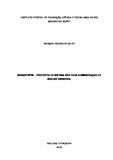Sensoryifrn – Protótipo de sistema web para administração de análise sensorial

Visualizar/
Data
2019-12-12Autor
Silva, Robson Ribeiro da
http://lattes.cnpq.br/8261677415900130
Metadado
Mostrar registro completoResumo
Historically, Brazil is a country whose main exponent of the economy was concentrated in the primary sector of food production, with a particular focus on export. In actuality, the food industry has a significant contribution to the national gross domestic product, GDP, representing approximately 10% of the same, through the analysis of the Brazilian Association of Food Industry (ABIA). These data are representative of the relevance of the abovementioned sector, which is still in expansion, and the need to develop tools helpers the production process and the creation of new food components. Thus, sensory analysis is a crucial procedure for measuring consumer preference on the visual aspects, mechanical and chemical responsible for impressing the five senses of the human body. One of the main problems of implementation of sensory analysis is the process of data collection and verification of data be performed manually and, consequently, allow the occurrence of errors that can directly influence the final result, as well as the exhausting work and time-consuming. In this sense, this work aims to develop a web application, called SensoryIFRN, which optimize the promotion of sensory analysis of food, in order to extinguish the problems encountered. For both, as a styling mechanism of essential requirements to the system mentioned, initially, it was essential to the execution of a bibliographic survey about the process of sensory analysis. In the making of this work were used the following tools: Java, Spring Framework, Eclipse IDE, MySQL, Git and Github, Heroku and Astah Community. As a result, the creation of the application, including the demand for resources essential for the desired purpose and the experiments proceeded attested to the important contribution of the system for the achievement of sensory analysis, demonstrating efficiency and optimization in the management of this activity. Therefore, the creation of support instruments to practice above is characterized as a factor indispensable for the industrial sector by, among other factors, to allow for the reduction of manual tasks currently used, increase the reliability of the collected data and minimize the demand for natural resources, with a view of the large consumption of leaves used.



